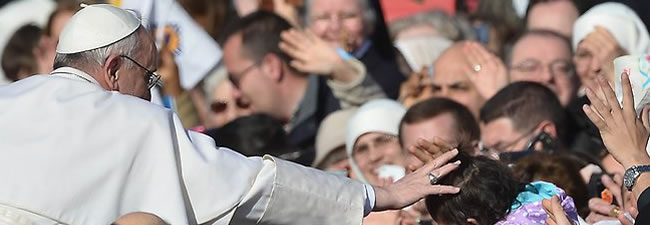
20 March 2013 – “Don’t forget the poor!” This was the first piece of advice Cardinal Jorge Mario Bergoglio heard when he was elected pope. The words spoken by his good friend, the Archbishop Emeritus of São Paolo, Cardinal Claudio Hummes, prompted the new pope to think about St Francis of Assisi. He chose to be named Pope Francis, after the humble saint, because he was a man for the poor, a man for peace and a man who protected creation.
A wholehearted attention for the poor is already making itself strongly felt in the papacy of the 76-year-old Argentinian Jesuit, whose simple yet profound words are permeated with calls to protect and care for those who are weakest in our society.
The other focal point is Jesus Christ, “the fundamental point of reference, the heart of the Church”, as Pope Francis told the media when he met them on 16 March.
In his inaugural mass at St Peter’s on 19 March, attended by some 150,000-200,000 people, Pope Francis stepped out of the open vehicle carrying him through the crowd to embrace a physically disabled man in what was the most moving moment of the beautiful hope-filled event.
In his homily, he urged the congregation, which included leaders of states and different religions from all over the world, to be protectors of God’s creation and of one another – a vocation not limited to Christian alone but “involving everyone” as it reflects human values.
Pope Francis spelled out clearly what this vocation entails: “protecting people, showing loving concern for each and every person, especially children, the elderly, those in need, who are often the last we think about… caring for one another in our families… building sincere friendships in which we protect one another in trust, respect, and goodness.”
And he singled out “tenderness” as an ingredient of protection: “We must not be afraid of goodness, of tenderness!”
Pope Francis held up St Joseph – whose feast is celebrated on 19 March – as an example of a discreet, loyal and wise protector who was “receptive to God’s plans, and not simply to his own”. Hearing God’s voice made Joseph “all the more sensitive to the persons entrusted to his safekeeping”, realistic and in touch with what was going on around him. In Joseph, continued the pope, we have a lesson in “how to respond to God’s call” and keep focused on Christ.
As for the pope himself, he “must be inspired by the lowly, concrete and faithful service which marked Saint Joseph and, like him, he must open his arms to protect all of God’s people and embrace with tender affection the whole of humanity, especially the poorest, the weakest, the least important, those whom Matthew lists in the final judgment on love: the hungry, the thirsty, the stranger, the naked, the sick and those in prison (cf. Mt 25:31-46).”

